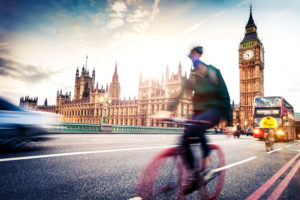MEASURES TO FACILITATE AND ENCOURAGE CYCLING
CYCLING IN CITIES: DEVELOPING GUIDANCE FOR LOCAL AUTHORITIES
Cycling is one of the cleanest and most efficient forms of transport. Recently the European Commission (DG MOVE) commissioned a study to produce guidelines to help promote cycling in the EU. TEPR is delighted to be working alongside FGM-AMOR with Ricardo Energy & Environment in developing these guidelines, which include the preparation of case studies from 20 cities across the EU.
These case studies will provide practical examples for the guidelines to help foster the implementation of cycling measures and cycling infrastructure. For the study, TEPR will be focusing on Copenhagen in Denmark, Brussels in Belgium, La Rochelle in France and Brighton in the UK.
Cycling is Good for Your Health and the Environment
It’s clear that cycling is both good for you and good for the environment. It is increasingly being seen as a mode of transport in its own right, and not just a recreational activity. The bicycle is a relatively simple machine, which has been around for hundreds of years since the Frenchman De Sivrac built the first bicycle-type vehicle in 1690. Since then the bicycle has evolved and is now a practical form of transport for millions of people.
Cycling is a low impact anaerobic activity, suitable for people of all ages. Regular cycling can lead to increased cardiovascular fitness, increased muscle strength and improved flexibility. Other benefits include improved mental well-being and reduced anxiety and stress. It’s also relatively inexpensive. There are certainly challenges for cyclists in many cities, but by collating and sharing good practice, as the guidelines being developed will do, it will help cities address these challenges.
Benefits of Cycling on the Environment
By reducing pollutants, cycling protects human health, as well as buildings, historic monuments and green spaces, from the adverse effects of pollution. The economic costs of traffic delays are also reduced because of less traffic congestion. Choosing to cycle rather than to drive a car contributes to creating a safer road environment and traffic will be slower and less dangerous as a consequence.
How Do Cities Compare?
Cities throughout the world vary dramatically as to how they perceive cycling and the facilities that they provide. The Danish capital Copenhagen “is built for cyclists and there are more bikes than cars in the city centre with a third of the city population commuting to work by bicycle. The city has 350km of wide cycle paths and lanes and has been voted best cycle city on numerous occasions*.” The city has a strong cycling culture.
Amsterdam – Measures to Prevent Bicycle Traffic Jams
Amsterdam is perhaps the most famous of cities for cycling. There are 880,000 bicycles in the city compared with a population of 800,000. More bike-parking facilities and cycling services are planned for the future to prevent bicycle traffic jams. Bordeaux in France has a growing reputation as a city that is actively promoting cyclists and other cities with glowing reputations include Ghent in Belgium, Dublin in Ireland and Oxford in England. An annual list of the most bike-friendly cities is produced by ‘Copenhagenize’ and not surprisingly after Copenhagen and Amsterdam, other cities in France, Belgium, the Netherlands and Germany feature in the top 20**.
The forthcoming guidelines
The guidelines that are being developed will draw on good practice from around Europe, and draw on the experience of the 20 case study cities. They will go online by the end of 2018.
Contacting TEPR
TEPR is an independent research consultancy that works on projects to improve active mobility, including cycling. For more details about the project in general, or the case studies in particular, contact Ian Skinner at TEPR via email or by calling +44 (0)7521 063324.


Leave a Reply
Want to join the discussion?Feel free to contribute!